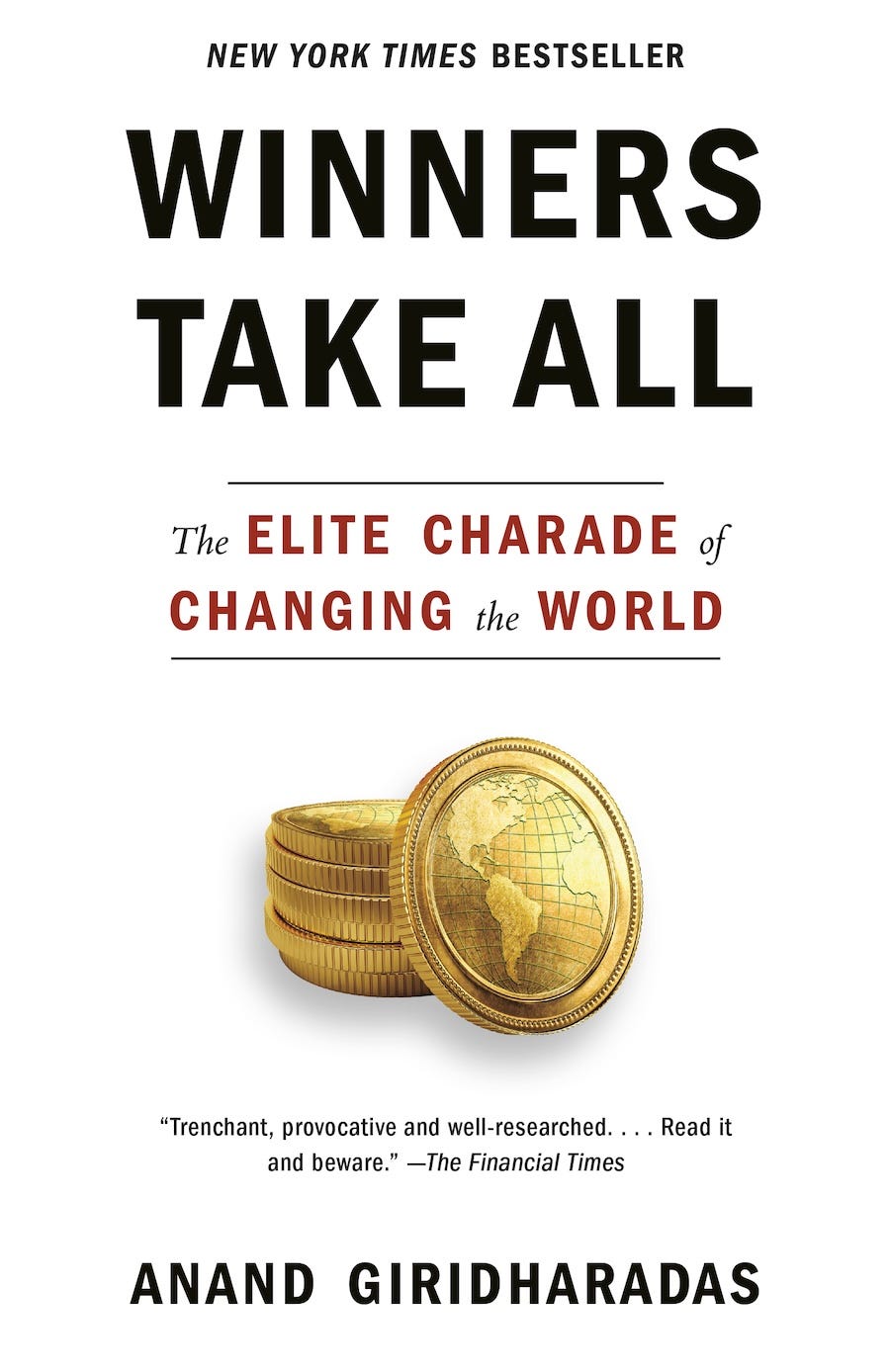SUMMER READING: Rebel-kings in worrisome berets, part two
Network effects, the new concentrations of power, and why it didn't have to be this way
It didn’t have to be this way.
What’s striking, looking back at Anand’s 2018 book, Winners Take All: The Elite Charade of Changing the World, isn’t just the fact that even since wealth has become more concentrated and the extremely wealthy have become radically more powerful, but that an alternative was so clearly on the table.
MarketWorld was ascendant, but in those days — before the rise of large language models and the mainstreaming of cryptocurrencies, and before the new tech oligarchs embraced far-right politics outright, there was an opportunity to build a very different world, rooted in the democratizing spirit of networking technology that those who promised to “change the world” only paid lip service to.
In the second half of “Rebel-kings in worrisome berets,” Anand lays bare the pretenses of “California capitalism,” listens in as a Silicon Valley audience hears some hard truths from an unlikely source, and explores a real alternative — platform cooperativism, a radically democratic application of tech thinking that had, in that moment, the potential to change the world.
Does such an approach still hold promise today? Read on below, and as always, let us know your thoughts.
For our supporting subscribers, we present the rest of the chapter below; if you missed it yesterday, just click on the following link for the first half:
It can be disturbing that the most influential emerging power center of our age is in the habit of denying its power, and therefore of promoting a vision of change that changes nothing meaningful while enriching itself. Its posture is not entirely cynical, though. The technology world has long maintained that the tools it creates are inherently leveling and will serve to collapse power divides rather than widen them. In the mid-1990s, as the Internet began reaching into people’s lives, Bill Gates predicted that technology would help to equalize a stubbornly unequal world:
We are all created equal in the virtual world, and we can use this equality to help address some of the sociological problems that society has yet to solve in the physical world. The network will not eliminate barriers of prejudice or inequality, but it will be a powerful force in that direction.
It is hard to overstate how influential this belief has become in MarketWorld, especially in Silicon Valley: The world may be cruel and unfair, but if you sprinkle seeds of technology on it, shoots of equality will sprout. If every girl in Afghanistan had a smartphone . . . If every classroom were linked to the Web . . . If every police officer wore a body camera . . . Mark Zuckerberg and Priscilla Chan have vowed to connect the unconnected as part of their philanthropic work, because the Internet “provides education if you don’t live near a good school. It provides health information on how to avoid diseases or raise healthy children if you don’t live near a doctor. It provides financial services if you don’t live near a bank. It provides access to jobs and opportunities if you don’t live in a good economy.” Some in the Valley have become downright glib about the leveling bias of technology. “Thanks to Airbnb,” the venture capitalist Marc Andreessen says, “now anyone with a house or apartment can offer a room for rent. Hence, income inequality reduced.” Investors like Andreessen, according to this view, are just like the Occupy movement, but with bigger houses and clearer results.
Networks are the basis for much of this new power—networks that simultaneously push power out to the edges and suck it into the core. This idea comes from an authority on networks, Joshua Cooper Ramo, a journalist turned protégé of Henry Kissinger, who some years ago became interested in how new varieties of power were upending the old laws of strategy and geopolitics. His study of networks and interviews with their owners became a book, The Seventh Sense, in which he says that this new
power is defined by both profound concentration and by massive distribution. It can’t be understood in simple either/or terms. Power and influence may yet become even more centralized than it was in feudal times and more distributed than it was in the most vibrant democracies.
Ramo is arguing that the Ubers and Airbnbs and Facebooks and Googles of the world are at once radically democratic and dangerously oligarchic. Facebook emancipates people in Algerian basements to write whatever they want, for all the world to see. Airbnb allows anyone to rent out their home. Uber allows anyone going through financial hardship to download the app and, without much hassle, get started making money. These platforms are pushing power out to the edges—power once controlled by media companies, hotel chains, and taxi unions. But networks tend toward extreme concentration as well. It is no fun if half of your high school friends are on the other social network, so Facebook becomes a de facto monopoly. A core tenet of network theory is that the bigger the network, the more juice it will be able to squeeze from every new connection. Networks, then, are those rare beasts that get healthier, tougher, and faster the fatter they become.






